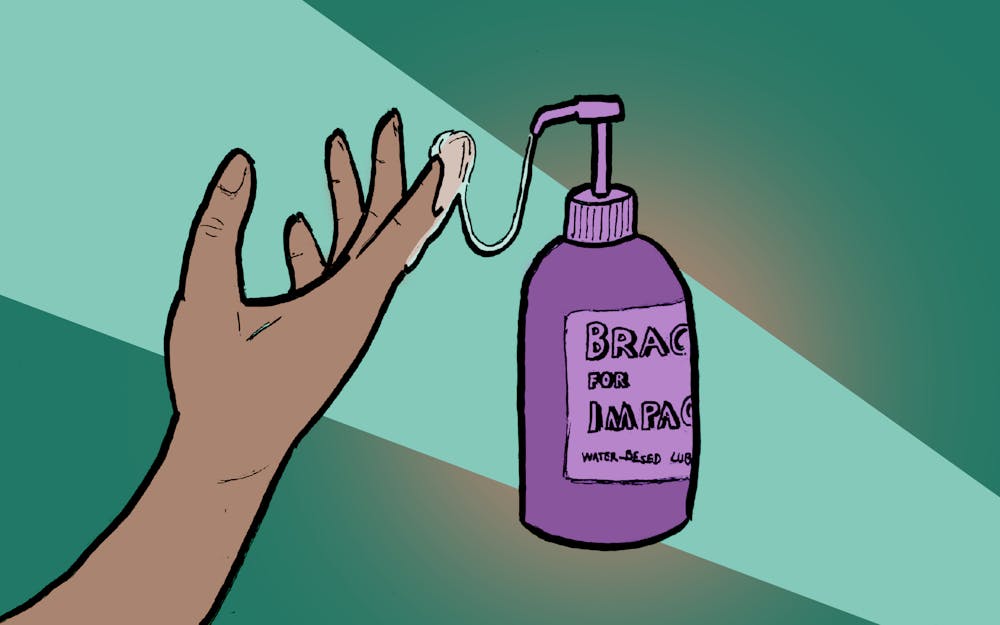There’s a lot of misinformation on the internet and social media regarding gender, sexuality and sexual health. Heather Eastman-Mueller, assistant director of sexual and reproductive health at IU's Student Health Center, responded to 10 common sexuality beliefs submitted to the Indiana Daily Student by IU students via Instagram.
1: You can’t get pregnant on your period- FALSE
“Although the risk is low, you can get pregnant on your period. There is a time during your menstrual cycle called the ‘fertile window’ where you are most at risk of getting pregnant. That is typically between days 11 and 21, but you can’t pinpoint when you will actually be ovulating, or releasing an egg. Another thing to keep in mind is that sperm can live up to 5 days.”
2: Using two condoms equals better protection- FALSE
“Using two condoms, or latex barriers, does not give you better protection because it actually breaks down the integrity of the condom. I reccomend for people in heterosexual relationships to take hormonal contraception to prevent pregnancy, and also use a barrier method, such as an internal or external condom or oral dam, to prevent STIs.”
3: The clitoris has more nerve endings than a penis- IT'S COMPLICATED
“There’s almost no research that says the clitoris has more nerves than a penis. However, the concentration of nerves are different. What you see visible with the clitoris is small, so when you’re trying to stimulate someone with a vulva it’s important to understand that the majority of the clitoris is underneath the vulva.”
4: Masturbation is medically harmful- FALSE
“Masturbation is actually the safest form of sex you can have. There is no risk of an STI or pregnancy, you can get to know your body and what pleases you which you can then communicate to a partner. It also releases sexual tension and alleviates stress, menstrual cramps, tension and it can help you sleep better.”
5: A person with a vagina can be “wet” but not aroused- TRUE
“Typically the vagina produces vaginal fluids to protect against injury and bacteria. For people who have vaginas, it is natural and normal to have lubrication at all times, whether aroused or not. It’s important to know the texture, smell and consistency of this fluid because if something is off it can indicate an STI.”
6: The “morning after pill” and an “abortion pill” are the same thing- FALSE
“The morning after pill prevents pregnancy from occuring. While people can take the pill up to five days after having unprotected sex, the sooner someone takes it, the better. It inhibits the release of the egg and alters the sperm’s transportation to the egg, so it won’t work for someone who is already pregnant. An abortion pill ends a pregnancy that has already happened and by blocking the necessary hormones that maintain a pregnancy and causes contractions to complete the abortion. This pill must be taken under medical supervision and needs a prescription, but the morning after pill does not.”
7: Bisexual and pansexual people are more likely to engage in threesomes than heterosexual people- FALSE
“Bisexuals are usually attracted romantically, emotionally or sexually to more than one gender, but not necessarily attracted at the same time or the same degree. Pansexuals are usually attracted to people regardless of their sexual or gender identity. Neither identity means they are attracted to everyone all the time or at the same time, and many pansexual and bisexual people stay in long-term monogomous relationships.”
8: Douching is a healthy way to clean a vagina- FALSE
“Douching companies do such a good job with marketing and shame people into believing their vagina needs to smell like ‘midsummer’s eve.’ In reality, a vagina is self cleaning and douches or scented soap destroy the healthy bacteria maintained by PH levels. If you need to wash your vagina or vulva, just use mild soap and warm water on the outside. Also, make sure you wipe front to back and urinate after insertive sex.”
9: Condoms are the only ways to prevent STIs- FALSE
“Use an oral dam if you are having oral sex on a vagina, and use flavored condoms for a penis. A combination of barrier methods, honest communication with your partner, and knowing your status are the best ways to protect against STIs.”
10: All transgender people undergo gender re-affirming surgery- FALSE
“People who identify as transgender transition or process their gender in their own ways, pace and process. Just because they identify as trans doesn't mean they will do hormone therapy or surgery. Don’t assume that every trans person wants to get their gentials or chest modified surgically to have their sex and gender identity aligned.”
To learn more about sexual health and to take advantage of IU Health programs such as virtual STI testing or free contactless delivery of sexual health items, visit the IU Health sexual wellness page.




